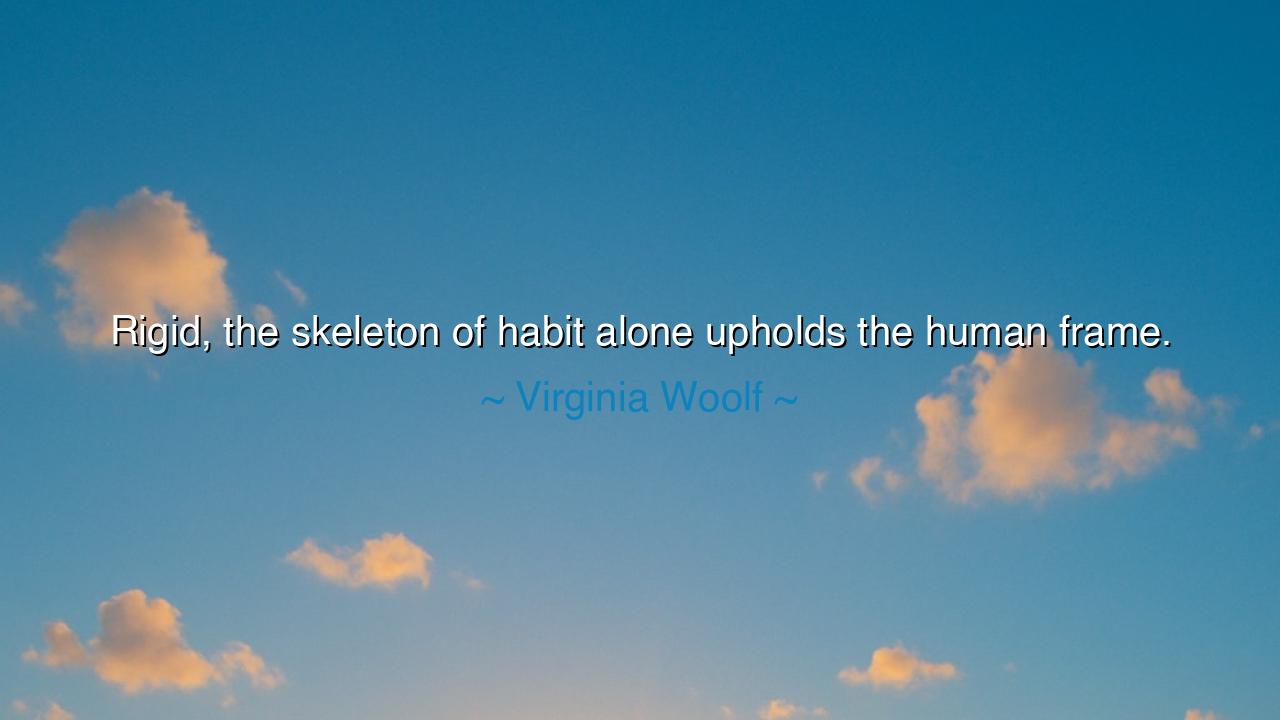
Rigid, the skeleton of habit alone upholds the human frame.






"Rigid, the skeleton of habit alone upholds the human frame." These profound words from Virginia Woolf carry with them the weight of truth: that it is not just the body that sustains us, but the unseen structure of habit that gives us shape, direction, and purpose. The human body is but a fragile vessel, susceptible to wear and tear, but it is the skeleton of routine, of ingrained patterns, that holds us upright amidst the turbulence of life. Habits are the silent architects of our lives, forming the scaffolding upon which we build our existence.
In the ancient world, philosophers often spoke of the necessity of discipline and habit in the pursuit of wisdom and virtue. Aristotle, in his work on ethics, argued that it is through repeated actions—through the establishment of virtuous habits—that we become virtuous individuals. Without these habits, the soul falters, and the body weakens, for habit is the muscle that strengthens the mind and spirit. Woolf, in her eloquent expression, reveals that this rigid structure is not just a matter of physical posture, but of psychological and emotional endurance. It is habit that binds us to the world, that keeps us tethered to purpose even when our strength falters.
Consider the warriors of old, who trained their bodies and minds to perform the same routines daily—archery, sword fighting, and discipline in the harshest of conditions. These habits were not born of leisure but of necessity. The great Samurai of Japan, for example, practiced their routines until they became second nature, for it was only in the rigid structure of their training that they could rise to the challenges of battle. Without such habits, their bodies would fail them in the face of war. In their discipline, they found their strength, their capacity to endure, and their very identity. It is this kind of structured habit that Woolf alludes to—a foundation that upholds us even in the most tumultuous of times.
Yet, habits are not always benign. In the lives of great leaders, such as Napoleon Bonaparte, one can see both the strength and the danger of rigid habit. Napoleon's success was in part due to his ability to maintain a rigid routine, his mind and body ever prepared for the demands of war. But the very habits that gave him strength also trapped him in cycles of overwork and obsession, leading to his eventual downfall. Habit, though foundational, can become a prison if we are not mindful. It is this paradox that Woolf highlights—the skeleton of habit can both uphold and confine us.
Woolf’s quote also touches upon the fragility of human existence. The body is but a vessel, held together by the invisible forces of routine and discipline. The frame of the body, in its ultimate form, is supported not by mere muscle or bone, but by the invisible strength of habit. When one is lost to disorder, when the foundation of habits crumbles, the frame becomes weak. As we age or face the ravages of time, it is often the habits we have cultivated—whether in thought, health, or action—that determine our resilience. For the body may falter, but the strength of our habits can carry us through.
The lesson here is clear: it is habit that shapes the course of our lives, that carries us forward even when we falter. Just as the skeleton supports the body, so too do our daily practices and routines uphold our purpose. But it is not enough to simply follow habits blindly. We must cultivate those that strengthen us and abandon those that weaken our spirit. The challenge lies not just in forming habits, but in shaping them wisely, in ensuring they serve our highest good. For in the end, it is these very habits that will determine the quality of our journey.
Thus, we must act with intention. Let us not wait for the habits of sloth or distraction to consume us. We must, each day, forge habits that build our inner strength and maintain our purpose. In moments of weariness or doubt, it is our habits—the quiet, steadfast routines—that will keep us upright, just as a skeleton holds the body firm. Let us build wisely, and let the skeleton of our habits be a foundation worthy of the life we wish to lead. In the rigidness of habit, there lies freedom, and in that freedom, the strength to endure.






AAdministratorAdministrator
Welcome, honored guests. Please leave a comment, we will respond soon